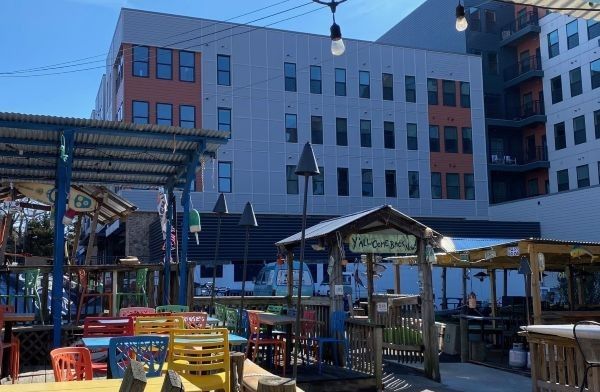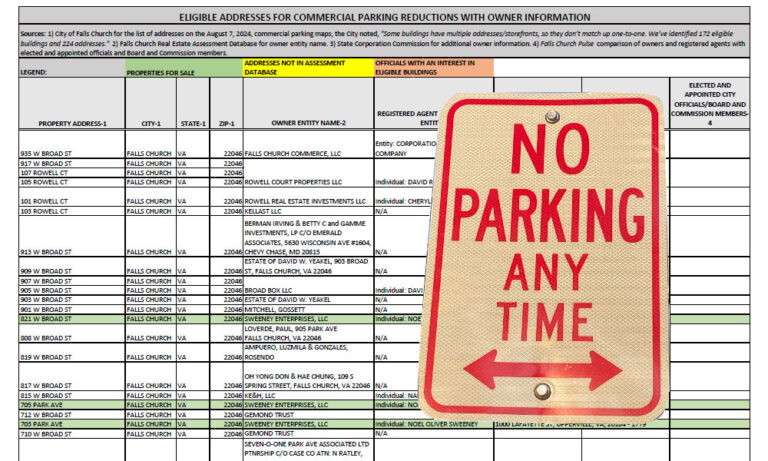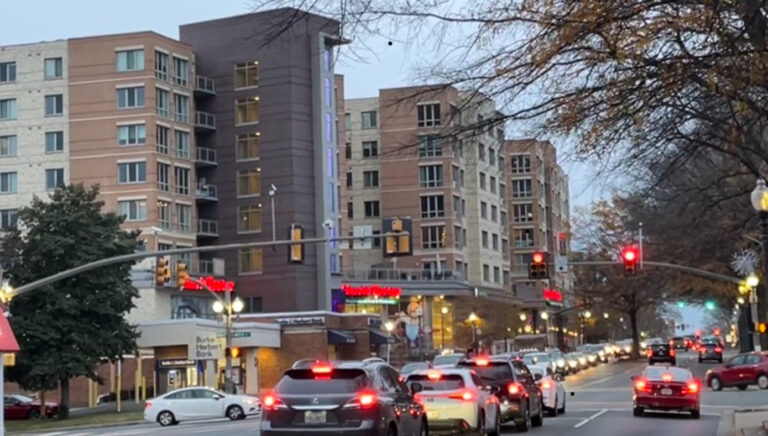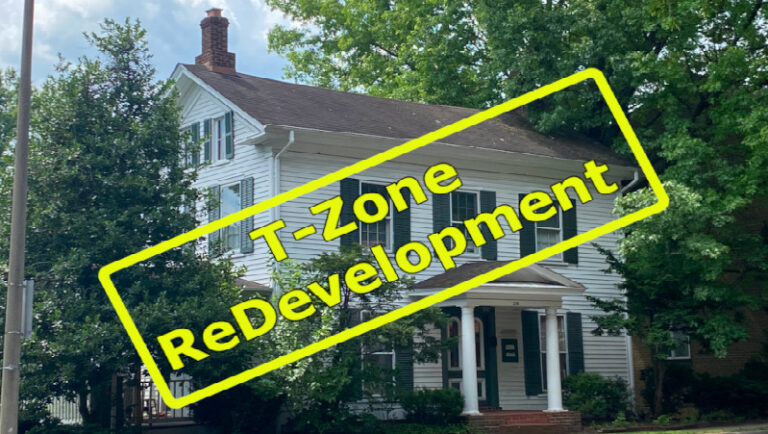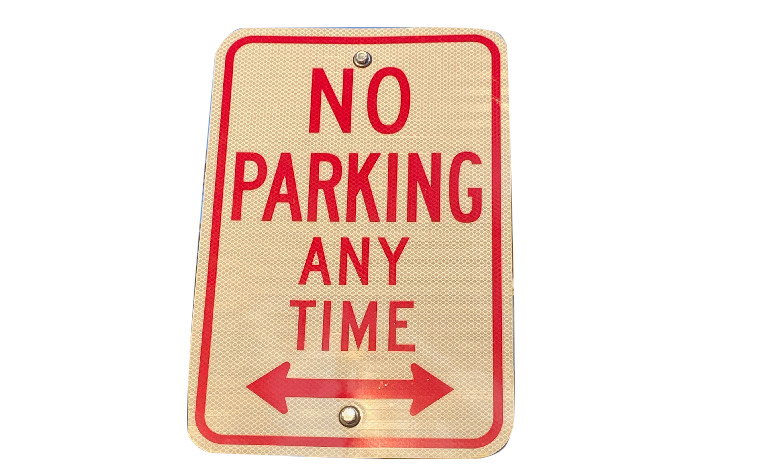Operating Next to a Major Development: 4 Lessons Learned
By Edith Snyder
Summary
- As Broad and Washington fully opens, the owners of a neighboring restaurant reflect on what they learned after operating through the proposal and construction phases of the major mixed-use development project.
- Lessons learned include the need for strong support from City staff and government for small businesses, a dedicated City project manager to represent all stakeholder interests and with the authority to resolve issues, the need for developers and owners to be responsible for the security of their buildings including parking, and a thorough review of the potential of each major project to create unintended consequences.
Broad and Washington opens
Nearly eight years in the making, the major mixed-use development at the corner of Broad and Washington Streets in Falls Church City saw its primary commercial tenant, the grocer Whole Foods Market, open its doors earlier this month. The project’s 339 apartments are now being rented, and the nonprofit professional theater Creative Cauldron is staging its first production, Steel Magnolias, at its new location in this building. [For background on the development, see Pulse posts Broad and Washington Project Primer, July 13, 2023, and Broad and Washington Architectural Plans, January 25, 2021.]
With Broad and Washington coming fully online, the Falls Church Pulse recently interviewed the owners of an adjacent small business, Clare and Don’s Beach Shack, for their lessons learned during the project’s proposal and construction phases with the goal of understanding the support existing enterprises need from the City, the developer, and their customers during future major development efforts.
Among those lessons are the need for strong upfront support from the City Council and the Planning Commission on behalf of affected small businesses before project approval, a dedicated City project manager responsible for such critical details as timely notice of road closings and electricity and water shutoffs, a standard commitment on the part of developers and owners that they will assume responsibility for security in their buildings and particularly in parking garages, and an assessment of potential unintended consequences to the business’s operations.
A “brutal” two and a half years

David Tax and his sister, Rebecca Tax, came to Falls Church in 2007, opening restaurants Clare and Don’s Beach Shack at 130 N Washington Street, and Lazy Mike’s Delicatessen, formerly where Founder’s Row I now stands and currently at 7049 Leesburg Pike near the City’s western border.
“The last two and a half years have been brutal,” Mr. Tax said. Broad and Washington developer Insight Property Group, LLC and builder John Moriarty & Associates “broke ground just as the worst of the Covid pandemic was ending. Business has been down 35%” since Covid began and through the development’s construction, he added. “With a small business, you are always on a razor’s edge. We are still reinvesting in our businesses, but we need to turn the corner.”
Lesson #1: Emphasize the importance of small businesses and address their issues with developers before approving projects
Perhaps the most valuable support the City Council and Planning Commission can provide is to emphasize to developers the importance of small businesses to Falls Church, Mr. Tax said. “Council members need to do more than say those words. They need to make it abundantly clear to developers upfront that we matter.”
The City Council did “a decent job” of expressing support, said Mr. Tax, official backing that he routinely stressed when meeting with the developer. Still, it was clear to Insight that approval would be theirs if they brought in a grocery store, and so some members of Council “pencil whipped this development,” he added.
Further, Mr. Tax would have appreciated the City staff’s help in thinking through all the impacts that a major development would have on his business. “I’m a restaurant guy,” he said, but found himself having to identify and resolve issues that he thought the City should have taken on.
“It was plain that Broad and Washington construction would have major impacts on neighboring properties during construction,” City Manager Wyatt Shields said in response. As an example, “parking was a really big issue” for Clare and Don’s and neighboring businesses restaurant Thompson Italian and the State Theatre, a live music and show venue, Mr. Tax said.
For Mr. Shields, “Parking is an example of collaborative problem solving during the project. The three businesses historically benefited from free parking on the City owned lot, and the loss of that parking was a pressing problem for the adjacent businesses. The City Council ensured that free public parking for those properties would be provided in the new Broad and Washington development.”
“During construction, the City reached an agreement with Kaiser to open its parking garage on weeknights and weekends for customers of these businesses,” Mr. Shields continued. “We encouraged Insight to reach an agreement with the office condo association to allow customers of Clare and Don’s, Thompson’s, and State Theater to use the office parking for free. Small things were done, too, like moving the Bike Share station off Park Place to open up a parking space for carry-out customers.”
However, from Mr. Tax’s viewpoint, “The City did not have a complete parking plan at the start of the project, including handicapped spaces. If the City is going to keep developing, staff need to think things through. The City has to be proactive and comprehensive in their planning.”
Agreements of substance between the businesses and Insight “literally happened the day before second reading,” the point in the proposal process when the City Council approves projects. “After second reading, it was anarchy – the developer could do whatever they wanted,” Mr. Tax said of Clare and Don’s experience.
Lesson #2: Appoint a City project manager to ensure effective communications and developer accountability
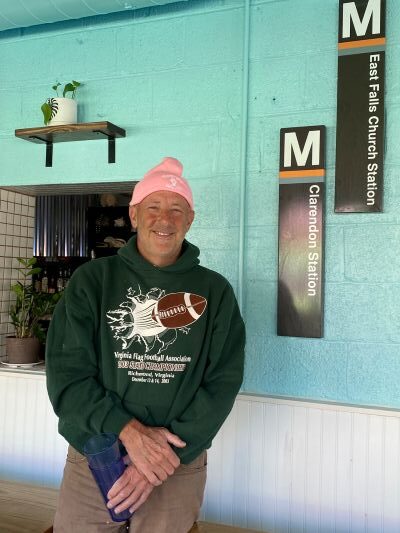
Mr. Tax recommended that the City designate a project manager for each approved development and task that individual with continuous, coordinated communication among all stakeholders throughout the construction phase. This project manager should act as a kind of ombudsman and be in a position to resolve issues. Mr. Tax specifically requested sufficient notice for all street closings and temporary electricity and water shutoffs and suggested that some street work be done at night at the developers’ expense to minimize disruption to existing businesses and the public.
Mr. Shields said that the City required the developer to establish a point of contact and hold regular community meetings to keep businesses and residents informed about upcoming construction impacts and to resolve problems. “These meetings were held between the construction team, neighboring property owners and businesses, and City staff,” he noted. “In addition to those scheduled meetings, City staff met on site regularly with adjacent businesses and the developer to resolve concerns as they came up.”
This was not Mr. Tax’s experience. In the case of the Broad and Washington project, “we typically only knew the day before or even the day of that a street would be closed or water shut off, which meant we were out of business until the road reopened or the water was turned back on,” he said. Clare and Don’s still needed to pay its employees even though the business had to close. He recalled one instance where the State Theatre received word the day before a sold-out show that their electricity would be cut off, requiring the theater’s management to scramble to ensure that did not happen.
This lack of communication has also been a problem for Lazy Mike’s with the periodic closing of Shreve Road for work at the West Falls development, Mr. Tax added.
Project managers assigned to future developments need to be City, not developer employees with the authority to ensure that developers are held accountable for what they have agreed to do; their messaging is consistent, whether they are talking with homeowners or businesses; and they do not attempt to “play groups or organizations against each other,” Mr. Tax said.
Mr. Tax noted that he attended multiple developer meetings with residents and the public and found that what was said differed depending on the audience. He also shared an instance where Broad and Washington’s developer put up signs in the parking lot for the old Applebee’s restaurant that was demolished for the larger building that read “Parking for Clare and Don’s and Thompson Italian Only,” leaving out the State Theatre. “I told [the developer] to take the signs down. We neither asked for nor knew about the signs. We’ve had a great working relationship with the State Theatre for years, and I did not want them hurt,” he said.
Lesson #3: Make developers and owners responsible for security once buildings open
The Falls Church police force is too small to be able to ensure the security of new multistory buildings, Mr. Tax said. He urged that it be the responsibility of developers to provide what he termed “vertical policing,” particularly in underground parking garages that permit public parking and where staff and customers might be vulnerable. He suggested regular patrols by developer/owner security officers, especially of garages.
In response to this concept, Police Chief Shahram Fard agreed that “property owners play a crucial role in maintaining a safe environment and taking reasonable steps to prevent foreseeable crimes and hazards in their buildings.”
“The number of City of Falls Church Police Officers is based primarily on our workload demands as well as the service delivery expectations of our community,” Chief Fard added. “The City’s population, geographical size, and infrastructure density can create both challenges and opportunities for the Department, but it’s best practice to use workload demands to guide our staffing models.”
Mr. Tax does hope that parking at Broad and Washington will remain one large lot rather than having designated spaces for specific businesses. “We all have the same customers,” he said. In addition, he is wary of the City’s current push to reduce parking requirements for developments. “We say we want to attract people from outside Falls Church to our events and restaurants, but if there is no parking, people aren’t going to come.”
Lesson #4: Think through possible unintended consequences
As new developments are proposed, Mr. Tax urged businesses and residents to consider possible unintended consequences. For Clare and Don’s, the surprise involved the restaurant’s investment in 31 solar panels on the property’s roof, which were installed 15 years ago in August 2010 and lauded by City officials and the Falls Church Chamber of Commerce at the time. Now the shadows cast by the seven-story Broad and Washington structure have reduced the electricity the panels generate by 40%.
Going forward
Whether Broad and Washington will ultimately prove positive for Clare and Don’s remains “to be determined,” Mr. Tax said. He hopes that Insight and its property management firm, Bozzuto, will be good neighbors. The restaurant has an agreement with Insight to continue the live music for which it is known until 10:00 pm on certain nights. Initial interactions with Bozzuto have been encouraging, he added.
David and Rebecca Tax anticipate that Creative Cauldron will be “the number one asset of the new development for Clare and Don’s. We plan to do a lot of crossover promotions and collaborations that will help both” the restaurant and the theater, Mr. Tax said. Secondarily, he expects that people driving down Park Place to park and shop at Whole Foods Market will pass by the restaurant and may be intrigued by “a cool and family friendly place.” The grocery store and the coming warmer weather will give Clare and Don’s exposure, ideally to new customers who don’t necessarily live in Falls Church.
Mr. Tax appreciates the restaurant’s loyal employees – “we have the same kitchen staff we had when we opened nearly 20 years ago” – and customers who have supported Clare and Don’s through the turmoil of the last five years. “We need continued community support and feel lucky to be in a place that allows us to be true to our beliefs” of care for employees, families, and the community as a whole.
Still, when asked what, if anything, he would have done differently given what he knows now, Mr. Tax said, “We probably would have sold this restaurant because it’s been really hard. We can’t get around the devastating effect the last few years have had on our professional and personal lives. We’re glad we didn’t sell it, though,” he continued, “now that we’re on the other side of construction.”
Said Mr. Shields, “Now that the construction is complete, it is a good time to assess lessons that we can apply to future projects in the City. Dave Tax has a valuable perspective that we are listening to.”

